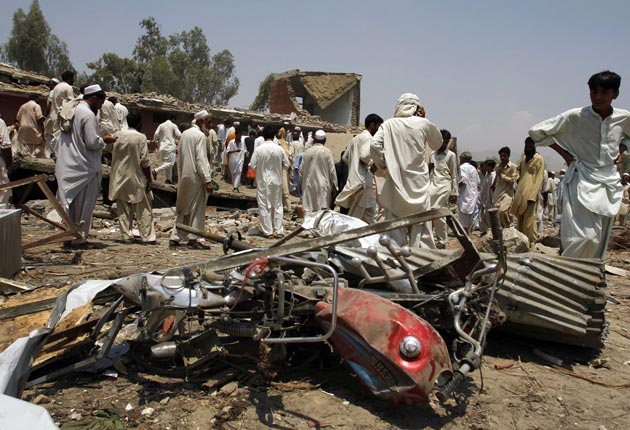Attack on tribal elders leaves 102 dead in Pakistan

Two suicide bombers – at least one on a motorbike – killed over a hundred people in north-west Pakistan where tribal elders had gathered to meet political representatives of the government. Officials said at least 102 people were killed and 80 more were wounded.
The attack, one of the deadliest in Pakistan this year, came in an area where the army has recently been active against the Taliban. One of the bombers' devices caused a small explosion but the second was large and created huge devastation. People and vehicles were buried under rubble and numerous shops and stores were wrecked. Five children, aged between five and ten, were said to be among the dead, and a nearby prison wall was damaged, with several inmates killed and others escaping. A senior elder and two others were killed in the attack.
"I was standing about 200 yards away when I heard the blast," one witness, Riaz Hussain, told Reuters. "I don't know how it happened but I could see several bodies on the ground after the explosion and people running in all directions."
The attack was in the village of Yakaghund in the Mohmand district, close to the border with Afghanistan. Hundreds of people had gathered outside the office of the civil administrator, Rasool Khan, and tribal elders had been scheduled to hold a meeting with him. Mr Khan, who escaped unharmed, said one attacker parked an explosives-laden vehicle a few metres from the office building and tried to escape on a motorbike that his comrade was driving.
"As they drove on the motorbike, one of the attackers detonated the explosives with a remote control before they could reach a safe distance," he said by phone. "Both attackers also died, and their motorbike was destroyed."
Also among those hurt were people displaced by ongoing fighting between the security forces and militants and who had been collecting wheel- barrows, tools and even wheelchairs. Some of the casualties were taken to be treated in Peshawar, capital of Khyber-Pakhtunkwa, formerly known as North-West Frontier Province.
Some reports on Pakistani television suggested that members of an anti-Taliban militia, or lashkar, had been meeting in the area and that they were the intended target of the strike. Yesterday morning's attack, for which a Taliban spokesman claimed responsibility, again underlines the enduring capability of militants to strike despite a series of offensives against them by the military over the past year.
Last year, the Taliban were first driven out of the Swat Valley, north-west of Islamabad, and in October troops began a major operation in South Waziristan. This spring, the offensive was extended to Orakzai. Military officials claim they are largely in control of Mohmand and have driven out most militants, though yesterday's blasts would disprove that.
Just days ago, the country's political leaders said they wanted to hold a national, cross-party conference to discuss new ways of tackling militant violence. The three-year wave of violence has killed at least 3,400 people and wounded tens of thousands more.
"We would like to convene a national conference to formulate a national policy on terrorism," said Prime Minister Yousuf Raza Gilani. "[Having been] hit hard, terrorists are on the run and seeking refuge in the urban areas of the country and attacking soft targets and spreading sectarian hatred."
Last week, an attack on the Data Darbar shrine in Lahore killed at least 45 people, itself just the latest in a series of strikes in the capital of the Punjab province and which triggered angry demonstrations. In late May, gunmen wearing suicide vests also stormed mosques belonging to the minority Ahmadi communityand killed more than 80 worshippers.
Subscribe to Independent Premium to bookmark this article
Want to bookmark your favourite articles and stories to read or reference later? Start your Independent Premium subscription today.

Join our commenting forum
Join thought-provoking conversations, follow other Independent readers and see their replies